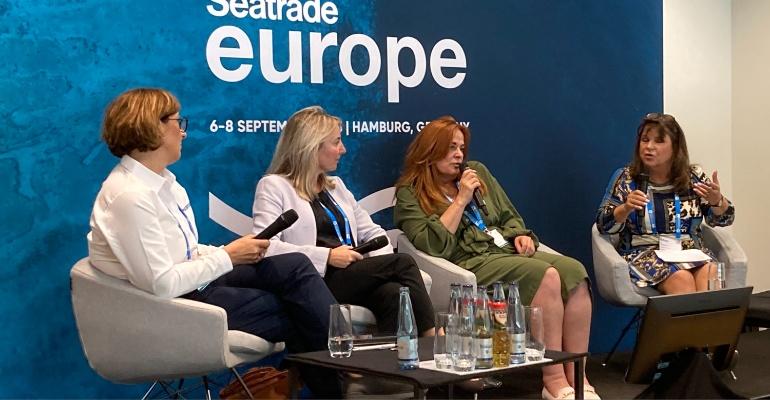These were just some of the main points that emerged during River Cruise Day on September 7, held in tandem with Cruise Europe (September 6-8.)
There was record participation from operators, suppliers and destination representatives at the event.
2024 outlook
The State of the River Cruise Industry comprised Arno Reitsma, CEO and president of Scylla and president of IG RiverCruise; Christopher Hackney, MD of Marella Cruises and TUI River Cruises; Lucas Schmitter, director of CroisiEurope; and Otto Groen, CEO of Rivertech Group.
The panellists agreed 2023 will be a strong year with volumes reaching, and even exceeding, 2019 levels.
Despite a low number of new ships entering the market in 2022 and 2023, orders are expected to resume. Capacity utilisation is good, without bottlenecks.
Results were mixed in late 2022 and winter 2022/23, however, bookings picked up quickly and continue to be at a high level, with encouraging signs for 2024.
As China has lifted almost all COVID-19 restrictions, enabling its citizens to travel internationally, overseas markets are recovering.
Crewing challenge
Exceptionally low or high tides have not affected Europe's river industry so far this year, contributing to smooth operations, although crewing remains a challenge for the river sector in the same way as for oceangoing cruise ships.
Approaching students about opportunities for employment in river cruising was discussed, with the industry open to people entering without prior cruise experience.
New destinations, younger passengers
The 'River Cruise Destination 101' panel indicated demand for innovative and active programs – featuring biking, hiking or walking elements, for example – appealing in particular to families and younger passengers.
The need for positive publicity was a further point raised, not only to gain the acceptance of local stakeholders, but to encourage locals to join the industry as guides, drivers or in other roles.
Reitsma outlined the need to communicate achievements more actively when it comes to sustainability, and distinguish between issues relating to the river cruise sector and the conventional cruise market.
Larger vessels not a priority
Building larger vessels is not a priority for river cruise operators, with no passenger demand for bigger ships. And infrastructure constraints limit the operational range of larger ships.
In fact, the sector is keen to optimise the operations of existing ships to support sustainability efforts, in particular. Various speakers said during the event that they had abolished buffets to lower food waste, while the use of plastic and paper is being reduced.
Schmitter described initiatives taken by his company in order to slash water consumption and wastewater generation, which has led to savings of up to 35% of water.
Reitsma outlined that the rivership sector intends to cooperate with ocean-going cruise lines more intensely on the research and development of alternative fuels and new propulsion technologies – a point evidenced by the MOU signed between IG RiverCruise and CLIA on Tuesday.
Room for new brands, demand for luxury
Rainer Büttner, executive director of operations at market newcomer Riverside Luxury Cruises, joined the programme to discuss supplier strategies. The Hamburg-based ultra-luxury brand acquired Crystal's former river fleet, consisting of five ships, and aims to offer passengers high-end experiences aboard and ashore, embracing shore excursions off the beaten track.
The suppliers' debate also featured the owner of Tourismus-Training SF and DonauGuides, Sebastian Frankenberger, as well as Andreas Rauland, project manager for cruise vessels at interior design and outfitting company Stinova. A core message that emerged from the session is long-term planning and clear communication of requirements can enhance the (already efficient) cooperation between suppliers and their customers.
Human resources remain a challenge for the river sector, particularly when it comes to shore excursions.
Investment in infrastructure at ports in berths and shore power also remains a concern.
Copyright © 2024. All rights reserved. Seatrade, a trading name of Informa Markets (UK) Limited.
Add Seatrade Cruise News to your Google News feed.  |

